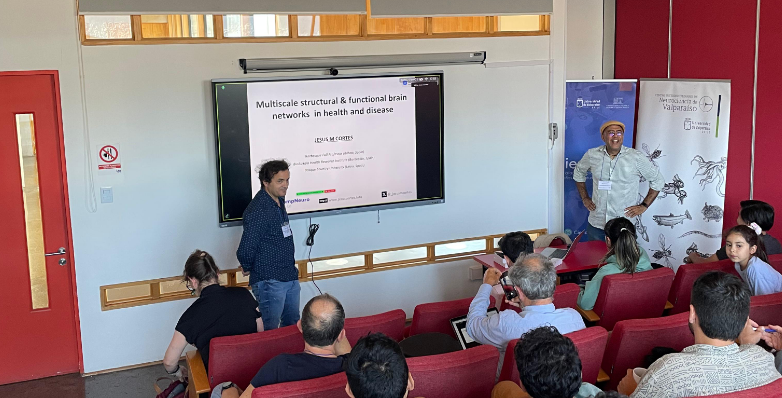From January 6 to 24, the seventh edition of the Latin American School of Computational Neuroscience (Laconeu) brings together students, researchers and experts from different corners of the world to promote training in an interdisciplinary field that is key to brain science.
The city of Valparaiso has once again become the epicenter of computational neuroscience by hosting the seventh edition of Laconeu, an academic event that brings together young scientists from Latin America, North America and Europe. This intensive program, which takes place between January 6 and 24, offers participants a unique opportunity to delve into the use of mathematical and computational tools applied to the study of the brain in different contexts: both in normal conditions and in pathological situations.
With computational neuroscience at its core, Laconeu has offered an innovative approach to the brain, integrating knowledge from disciplines as diverse as neuroscience, mathematics and computation. This multidisciplinary approach allows progress in areas such as biomedical research, brain imaging analysis and the design of personalized treatments for various pathologies.
Dr. Patricio Orio, researcher at the Interdisciplinary Center for Neuroscience of the University of Valparaiso (CINV) and one of the main organizers of the event, highlighted the geographic and academic diversity of the participants. This year, the call has attracted students from countries such as Colombia, Argentina, Brazil, Uruguay, Chile, France and the United States, which reflects the growing internationalization of the school.
“This event seeks not only the transmission of knowledge, but also the promotion of collaboration and the exchange of ideas among participants, who come from very diverse contexts and realities,” said Orio. In this sense, the program is not limited to master classes and workshops, but also includes lectures and discussions that address the most recent advances in computational neuroscience, as well as the ethical challenges that this discipline poses.
A highlight of Laconeu 2025 is the inclusion of talks open to the scientific community, in which topics of great relevance to society, such as neuro-rights and research on consciousness, will be discussed. These spaces for reflection and debate seek to make visible the ethical dilemmas associated with the use of technologies for the manipulation and analysis of the human brain.
This year, the school will count with the participation of world-renowned scientists, including: Pamela Guevara (Chile), Wael El-Deredy (Egypt), Patricio Orio (Chile), Jorge Silva (Chile), Adrián Palacios (Chile), Lucia Melloni (Germany), Inés Samengo (Argentina), Josefina Cruzat (Chile), Bruno Cessac (France), Johanna Senk (UK), Jesús Cortés (Spain) and Ruben Herzog (Chile), who will share their knowledge and experiences with the participants.
With each new edition, Laconeu consolidates as an international academic reference in the field of computational neuroscience, offering a space for collaborative learning and critical reflection that will allow future researchers and scientists to face the challenges of a scientific field of enormous potential and transcendence.

